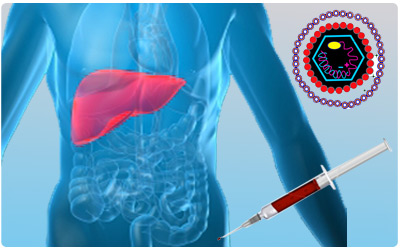- Recommendations for Identification and Public Health Management of Persons with Chronic Hepatitis B Virus Infection - (http://www.cdc.gov/mmwr/preview/mmwrhtml/rr5708a1.htm)
- Recommendations for Routine Testing and Follow-up for Chronic Hepatitis B Virus (HBV) Infection - (http://www.cdc.gov/hepatitis/hbv/pdfs/chronichepbtestingflwup.pdf)
- Testing and Public Health Management of Persons with Chronic Hepatitis B Virus Infection - (http://www.cdc.gov/hepatitis/hbv/testingchronic.htm)
About
It is estimated that approximately 350 million people worldwide have hepatitis B infection. The risk of transmission of hepatitis B virus (HBV) due to blood transfusion exceeds that of hepatitis C virus (HCV) or human immunodeficiency virus (HIV) and most people are unaware of their infection.
Acute hepatitis B infection usually refers to the first 6 months after someone is exposed to the hepatitis B virus. Once infected, some are able to fight the viral infection while in some others the infection leads to a “chronic state,” or lifelong illness. In such individuals the infection over a period of time can cause serious life-threatening problem. Hence, screening and early diagnosis of the condition is important so that due precautions and treatment if necessary can be undertaken.

Which people should be screened for hepatitis B and why?
Spread of Hepatitis B occurs through blood products, sexually as well as from mother to fetus. Screening is recommended for persons at high risk for contracting the disease. These include:-
- Hemodialysis patients
- Pregnant women
- Infants born mothers who are HBsAg-positive
- Persons known or suspected of having been exposed to HBV - donors of blood, organs, and tissues
- People born in areas where HBsAg (Hepatitis B surface antigen) prevalence is found to be equal to or more than 2%
- Men who have had sex with men
- Drug addicts using injectable drugs
- HIV positive individuals
- Patients likely to take immunosuppressive treatment or cancer chemotherapy
- Patients with increase in liver enzymes of undetermined cause
What tests are used for screening hepatitis B?
The following tests are used for HBV screening:-
Hepatitis B surface antigen:- A blood test to detect the presence of hepatitis B surface antigen (HBsAg) is used to screen people for hepatitis B. Persons who test positive can spread the infection to others. The test turns positive around 3 to 5 weeks after a person has been exposed to the virus. It persists in individuals who are chronically infected, but disappears once the infection has resolved. In brief it indicates:
| Hepatitis B surface antigen (HBsAg) | Active HBV | Screening Test for HBV infection. Sometimes may be falsely negative in some patients with active HBV. Positive person can spread infection. Persistence after 6 months indicates chronic infection. |
Anti-HBs:
This test detects the presence of antibodies to the hepatitis B surface antigen i.e. if the person has been previously exposed to hepatitis B. It tests positive in persons who are immune to hepatitis B or have recovered from hepatitis B infection. It indicates that the person has protective immunity against hepatitis B and will not pass the infection to others.
| Hepatitis B surface antibody (HBsAb) | Positive test indicates patient is immune to HBV (through past exposure or vaccination) | Negative test indicates that the patient is not immune; if active HBV disease is not present, consider vaccination |
Total anti-HBc: This test detects the presence of antibodies to hepatitis B core antigen. It is positive in acute as well as in chronic infection and in those recovered from hepatitis B. There are two types of anti-HBc antibodies. The presence of the IgM subtype is indicates acute infection or reactivation of infection, whereas the IgG subtype indicates chronic infection. In brief:
| Hepatitis B core antibody (HBcAb), IgG Ig M | Positive test indicates past exposure to HBV and does not indicate whether patient has active infection or has cleared infection (check HBsAg and HBsAb) Indicates Chronic infection Indicates acute infection or reactivation of infection | Negative test indicates that the person has probably has not been infected with HBV |
Frequently Asked Questions
1. Which doctor should I consult in case my test is abnormal?
You should consult a general physician, gastroenterologist or a hepatologist in case your test is abnormal.
2. Why is screening for hepatitis B important?
People infected with hepatitis B often do not suffer from symptoms. However, if the infection is present for a long duration, it results in life-threatening liver complications. Hence, early detection is necessary to treat the condition before complications develop.
3. Can there be a chart that can help with interpretation of the results?
http://peerviewpress.com/files/order_form/Integration-Files/Downloadables/6744.pdf






